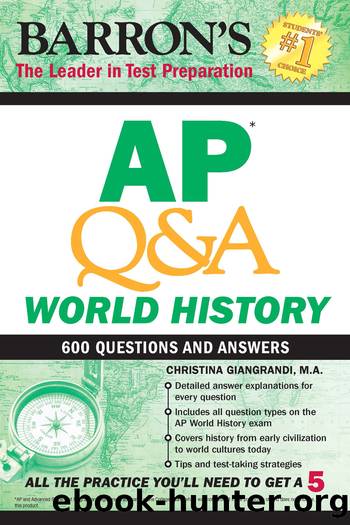AP Q&A World History by Christina Giangrandi

Author:Christina Giangrandi [Velasquez, Manuel]
Language: eng
Format: epub
ISBN: 9781506272085
Publisher: Barrons Educational Series
Published: 2018-07-15T00:00:00+00:00
(Answers on pages 353–357.)
Imperialism and Nation-State Formation
Answers for Chapter 14 are on pages 357–362.
CHAPTER
14
Key Concept 5.2—As states industrialized, they also expanded existing overseas empires and established new colonies and transoceanic relationships.
I. Industrializing powers established transoceanic empires.
A. States with existing colonies strengthened their control over those colonies.
B. European states, as well as the United States and Japan, established empires throughout Asia and the Pacific, while Spanish and Portuguese influence declined.
C. Many European states used both warfare and diplomacy to establish empires in Africa.
D. In some parts of their empires, Europeans established settler colonies.
E. Industrialized states practiced neocolonialism in Latin America and economic imperialism in some parts of the world.
II. Imperialism influenced state formation and contraction around the world.
A. The expansion of U.S. and European influence over Tokugawa Japan led to the emergence of Meiji Japan.
B. The United States, Russia, and Japan expanded their land borders by conquering and settling neighboring territories.
C. Anti-imperial resistance took various forms, including direct resistance within empires and the creation of new states on the peripheries.
III. In some imperial societies, emerging cultural, religious, and racial ideologies, including Social Darwinism, were used to justify imperialism.
Download
This site does not store any files on its server. We only index and link to content provided by other sites. Please contact the content providers to delete copyright contents if any and email us, we'll remove relevant links or contents immediately.
| ASVAB | GED |
| GRE | NCLEX |
| PRAXIS | SAT |
| See more | Flash Cards |
| Study Guides | Study Skills |
| Workbooks |
Talking to Strangers by Malcolm Gladwell(11880)
The Compound Effect by Darren Hardy(7562)
The Lover by Duras Marguerite(7116)
Wonder by R. J. Palacio(7060)
Tools of Titans by Timothy Ferriss(6950)
The Circle by Dave Eggers(6257)
A Court of Wings and Ruin by Sarah J. Maas(6079)
Kaplan MCAT General Chemistry Review by Kaplan(6054)
Deep Work by Cal Newport(5471)
To All the Boys I've Loved Before by Jenny Han(5182)
Wiseguy by Nicholas Pileggi(4586)
1,001 ASVAB Practice Questions For Dummies by Powers Rod(4039)
The Body: A Guide for Occupants by Bill Bryson(3802)
Barron's AP Biology by Goldberg M.S. Deborah T(3632)
Cracking the GRE Premium Edition with 6 Practice Tests, 2015 (Graduate School Test Preparation) by Princeton Review(3597)
ACT Math For Dummies by Zegarelli Mark(3565)
Eat That Frog! by Brian Tracy(3514)
Kaplan MCAT Organic Chemistry Review: Created for MCAT 2015 (Kaplan Test Prep) by Kaplan(3423)
Pre-Suasion: A Revolutionary Way to Influence and Persuade by Robert Cialdini(3415)
